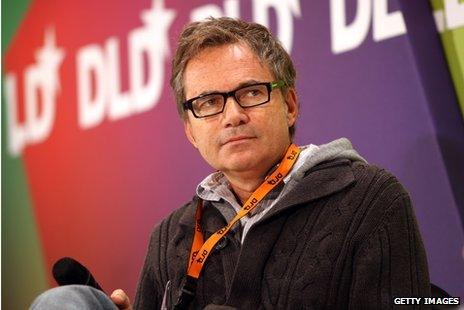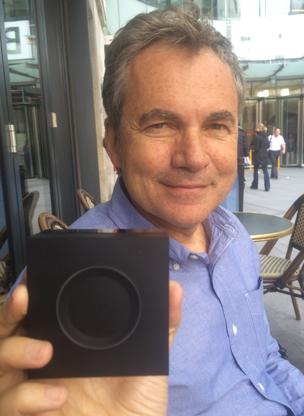Spain’s social wi-fi tycoon
- Published
- comments

Nine years ago, Martin Varsavsky unveiled what sounded like a barmy idea - getting people to plug in a piece of kit to their home router and share their wi-fi with anyone who happened to be passing by.
But Fon, the first social wi-fi network, took off, and what was intended to be a not-for-profit enterprise has grown into a substantial business, with backing from investors ranging from BT to Google. It is in 13 million homes and claims to be the world's biggest wi-fi network, reaching 200 million people.
Now Mr Varsavsky, who from his Madrid base has become one of Europe's most successful telecoms entrepreneurs, has a new and perhaps equally unlikely mission. He wants to turn us all into the kind of people who are happy for our friends to play their music in our homes.
Today sees the launch of Gramofon, a joint venture with Spotify, to enable social sharing of music. It involves plugging in a new version of the Fon router - a small attractively designed black or white device - and connecting it to the internet and to your home music system. You then pair it with an app which allows you - or your Facebook friends - to stream music from Spotify and a number of other services.

"It's going to be the Apple TV for sound," Martin Varsasvsky told me when he popped by for a coffee yesterday to explain the service. He told me he'd been lecturing on entrepreneurship in New York when after giving his students a start-up project task they'd challenged him to come up with his own idea. "I went to a party where everyone was arguing over whose music from whose smartphone they wanted to play - that's when the idea came to me."
Now, despite some impressive design, I struggled to understand why Gramofon would take off. It seems to combine a number of things - streaming music services, hardware that distributes your music around the house - that are already done very well by existing businesses. I suppose it adds a social element but how many people really want to invite guests to take over the control of their music when they come to visit? It sounds to me like quite a small niche.
Still, like so many new technology ideas, Gramofon is launching on the Kickstarter crowdfunding platform, which is a good way of testing the appetite for the product.
And it's encouraging to see a new technology venture coming out of Europe when so much of the innovation we see emerges from one small part of the United States. Martin Varsasvky has a track record of building businesses which rapidly go global from his Spanish base,
He is also very positive about the continent's prospects: "I am very optimistic about the way Europe is going, it has a very well-trained population," he said, "and companies like Google make more money in Europe than the United States."
He does concede that Europe has a problem with regulation, especially for smaller companies, and would like to see what he calls an infancy law." Start-ups are like infants that need special care. I would say until a company is three years old, has more than 30 employees and is profitable it should be allowed to operate outside lathe labour regulations."
But, despite regular forays to the US, he promised to continue to invest on this side of the Atlantic: "I am happy building companies in Europe because I find incredibly talented engineers and employees."
Martin Varsavsky is one of a new breed of European tech tycoons, from Daniel Ek of Spotify, to the Skype founder Niklas Zennstrom, who look at the global market from the moment they start a new venture. Perhaps there is a lesson there for young British entrepreneurs looking to become the next Mark Zuckerberg.